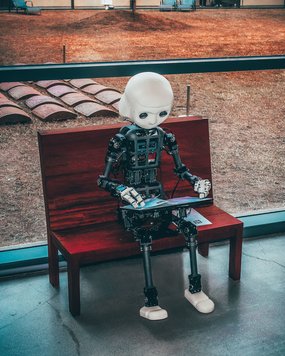
Recent developments in technology have accelerated the influence of Artificial Intelligence (AI) on our lives.
These reports outline findings from questions relating to generative AI[1] included in our 2023 and 2024 Annual Literacy Surveys and explore children, young people’s and teachers’ attitudes, behaviour and confidence around using generative AI to support literacy and learning. 53,169 children and young people answered questions about generative AI in our 2024 Annual Literacy Survey. The reports focus on findings from 15,830 young people aged 13 to 18 and 1,228 teachers from schools across the UK.
Key findings
Young people’s use of generative AI
- The percentage of 13- to 18-year-olds who said they had used generative AI increased from 2 in 5 (37.1%) in 2023 to 3 in 4 (77.1%) in 2024.
- In 2024, a similar percentage of boys than girls said they had used generative AI in 2024 (78.3% vs. 76.4%) and young people who did, and did not, receive free school meals (FSMs) were equally likely to say they had used it (77.7% vs 77.3% respectively).
Most young people who used generative AI regularly told us they used it for entertainment, curiosity, homework and inspiration. In terms of literacy-related uses:
- More than 2 in 5 (44.4%) 13 to 18s told us they used generative AI to have a chat, almost 1 in 5 (18.5%) to write stories, 1 in 8 (12.8%) to write poems or lyrics and 1 in 11 (9.0%) to write non-fiction.
Young people’s attitudes to using generative AI to support learning and literacy were generally positive. For example:
- Most (1 in 2) young people aged 13 to 18 agreed that that generative AI helped them with ideas (56.6%, or 1 in 2), to understand things (52.2%) or to learn new things (50.8%). In addition, 2 in 5 (39.6%) said it helped them with writing, and 1 in 4 (23.2%) felt it helped them with reading.
- Almost 1 in 2 (47.4%) young people said that, when they use AI, they usually add their own thoughts into anything it tells them, while 2 in 5 (39.9%) said they checked outputs from generative AI as they might be wrong.
- However, 1 in 5 (20.9%) said that they usually just copied what generative AI told them and 1 in 5 (20.6%) did not check outputs, suggesting greater support may be needed to ensure this group of young people have the information and skills they need to critically evaluate AI responses.
Teachers’ use of generative AI
- The percentage of teachers who had used generative AI increased from 3 in 10 (31.0%) in 2023 to 1 in 2 (47.7%) in 2024. More than twice as many secondary as primary teachers reported using it in 2024 (56.8% vs 30.9%).
Teachers’ attitudes to their own, and pupils’ use of generative AI to support learning and literacy were mixed. For example:
- Nearly 2 in 5 (37.7%) teachers were concerned about their pupils using generative AI in 2024, with more secondary than primary teachers concerned about this (45.1% vs 19.7%). However, 41.0% of teachers also said they were not worried (21.3% weren’t sure).
- While almost 2 in 3 (64.8%) teachers felt generative AI could model good writing for their students, 1 in 2 (48.9%) also agreed that it was likely to have a negative impact on children’s writing skills.
- More than 4 in 5 (82.0%) agreed that students should be taught how to engage critically with generative AI tools and 3 in 4 (75.3%) teachers said they also needed more training, support and resources to use generative AI tools effectively.
These findings provide initial insight into how children, young people and teachers’ use of and engagement with generative AI has changed over the last year. Findings suggest that more training and support could help teachers and students alike to gain the vital skills they need to benefit from effective, critical and creative interactions with generative AI.
[1] “Technology that can be used to create new content based on large volumes of data that models have been trained on.” (Department for Education [DfE], 2023)